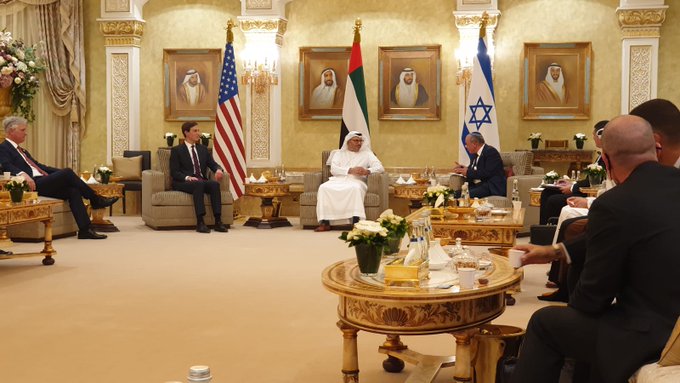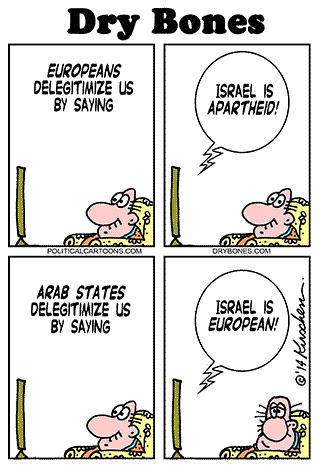Jonathan Tobin: Why they scrawl ‘Free Palestine’ on synagogues
The impulse to spray paint “Free Palestine” on Jewish sites is an injustice not just because it is vandalism, but also because the conflict between Israel and the Palestinians has nothing to with a synagogue—and certainly not one on in the Midwestern United States. Blaming American Jews for the grievances that some may have against Israel, regardless of the merit or lack thereof of such complaints, is also a form of anti-Semitism.Melanie Phillips: The free world's craven and hypocritical fifth column
Nevertheless, the connection between the BLM movement and anti-Israel sentiment is an undeniable fact. So it is hardly surprising that when demonstrators began marching through a residential neighborhood in Kenosha chanting and threatening people in the dead of night, one participant would choose to scrawl “Free Palestine” with a can of paint in the driveway of the Beth Hillel Temple.
Should such incidents influence American Jewish attitudes towards the BLM movement or impact black-Jewish relations?
No matter what is done by BLM marchers or said in the platform promulgated by the movement to support intersectional critiques of Israel and backing for BDS, there is nothing that will shake the overall Jewish commitment to the cause of social justice and equal rights. Despite well-founded concerns about the BLM movement itself, sympathy and support for efforts to fight to save black lives and to create a more just society will always have overwhelming Jewish support.
Still, Jewish groups can and must make clear to their African-American counterparts that they will not accept a situation in which anti-Zionist agitation, which is inherently anti-Semitic and often threatening to Jews, is tolerated—let alone encouraged. Where insults and threats happen, violence often follows, as we saw last year in the spate of anti-Semitic attacks on Orthodox Jews in the Greater New York area by African-Americans.
Yet just as concerns about racism do not justify violence or attacks on property, there should also be a clear understanding that acceptance of anti-Semitic lies about Israel or its American supporters cannot be tolerated. Those who allow themselves to be so taken up by the outrage propping up the BLM movement to rationalize or excuse vandalism like “Free Palestine” must realize that this undermines that cause. It also obligates Jews and those who claim to speak for them to stand against their efforts.
Even now, the British government is obsessed with meeting the Palestinians' demands; even now, it is perpetuating the falsehood that Israel is not legally entitled to apply its sovereignty to the disputed territories.The End of the UAE Boycott Is a Blow to BDS
The prime minister, Boris Johnson, couched his tepid welcome for the United Arab Emirates' historic decision to normalize relations with Israel as a welcome for Israel's suspension of its sovereignty plan.
Raab reportedly came to Jerusalem to try to persuade Israel to drop this plan altogether. Quite apart from their malice and shamelessness, the Brits simply haven't grasped that the issue for the region is no longer the Palestinians (as if it ever was). It's now Iran.
It is fear of Iran that fueled the UAE deal. The Gulf states understand that they need Israel and the United States to neutralize the threat of Iranian regional hegemony. And they are deeply concerned that if Joe Biden becomes president, he will become Obama mark two, reinstating the JCPOA and again paving the way for an Iranian nuclear bomb with international approval.
Clearly, this concern is shared in Jerusalem, so much so that it's prompting some to wonder whether Israel will attack Iran before November's election.
Trump's resumed sanctions have weakened the regime. The assassination of Qassem Soleimani, the strategic genius of the Iranian Revolutionary Guards Corps' Quds Force, was a blow from which it has not recovered. There also has been a series of unexplained explosions in Iran's sensitive weapons infrastructure.
So there's never been a more promising opportunity to deliver a decisive blow against the regime, preferably by reimposing draconian sanctions. But there's also never been such a dangerous time, with rising tensions and increasing Iran-backed attacks across both the Lebanese and Gaza borders – and with this wounded regime perhaps determined, if it believes it is indeed going down, to take Israel with it.
Such a time demands a unified resolve among those trying to stop this evil. And standing up against it are the United States, Israel, and the Gulf states.
But on the other side stand the United Kingdom, France, and Germany, supporting Russia and China in shoring up a regime that has waged a 40-year war against the West, intends to wipe Israel off the map, and is getting ever closer to possessing the nuclear weapons that it thinks will enable it to do so.
Britain, France, and Germany now risk becoming a shocking fifth column in the defense of the free world.
The Boycott, Divestment, and Sanctions (BDS) movement against Israel suffered a major blow this weekend, when the UAE revoked its 1972 decree to boycott the State of Israel. Abu Dhabi’s crown prince, Sheikh Mohammed bin Zayed Al Nahyan, effectively tore up the decree as part of the nascent Abraham Accord signed with Israel.
Even though Israel has powered through the Arab boycott — becoming a regional economic superpower — the UAE’s symbolic move is a message in a bottle: we are open to Israel for business. The end of the boycott effectively implies normalization of trade and commerce between the two nations. UAE citizens, in other words, may soon find “Bamba” — an Israeli snack food — in their supermarkets.
This, of course, is an affront to the traditional mandate of most Arab nations since Israel’s inception, if not before. The Khartoum Resolution of 1967 set the stage for a steadfast political and economic boycott of Israel. It was at this summit, following Israel’s shocking victory in the Six-Day War, that the Arab League declared the now infamous “Three Nos”: no peace with Israel, no recognition of Israel, no negotiations with Israel.
The boycott unified Arab states in the region and at the United Nations. Anti-Israel resolutions intensified and became the norm. But Israel’s peace treaty with Egypt in 1979 and then with Jordan in 1994 weakened the Arab alliance — and with it, its boycott. Still, there was no love lost between Israel and its new “friends.” It was a cold peace, and trade and commerce between them was minimal.
The boycott movement re-intensified with the failure of the Oslo Accords and the onset of Palestinian terrorism against the Jewish state.
Terror failed to bring down Israel. The Palestinian leadership turned to promoting an intensive defamation and boycott campaign in an attempt to criminalize Israel, called BDS. The campaign was linked to labeling Israel an “apartheid state,” and it falsely drew parallels with apartheid-era South Africa. Across the West, students on university campuses lobbied for BDS and tried deceiving the international community by calling Israel a racist state.


































